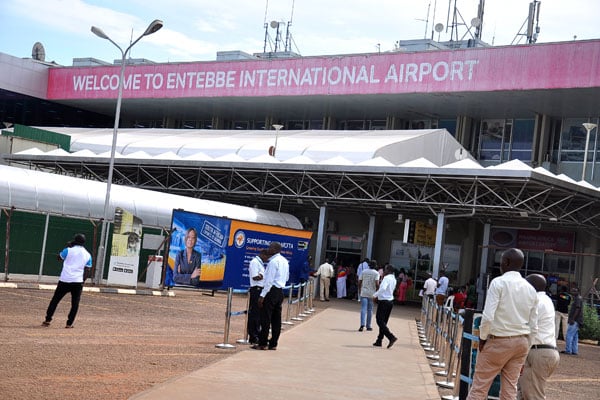Prime
Wonder Ebola drugs cure 20 patients in Uganda

Members of the Ugandan Medical staff of the Ebola Treatment Unit stand inside the ward in Personal Protective Equipment (PPE) at Mubende Regional Referral Hospital in Uganda on September 24, 2022. PHOTO | AFP
What you need to know:
- The drugs were provided by the US government.
- 54 issue: The number of people who have so far contracted Ebola. At least 19 people have succumbed to the disease.
Doctors in Uganda, using at least two trial drugs, monoclonal antibodies, Remdesivir and other supportive treatments, have managed to save 20 people who were infected with Ebola Sudan virus.
The monoclonal antibody is a type of protein which is manufactured in the laboratory and is administered in the patient to neutralise the targeted infectious agents. Remdesivir, on the other hand, is a broad-spectrum antiviral drug which was previously tested in Covid-19 patients.
Dr Jane Ruth Aceng, the Health minister, said with these drugs and community engagement, the country is making good progress in containing the epidemic, which has infected 54 and killed 19.
“The US government came in very quickly to provide for us trial drugs –Remdesivir and monoclonal antibodies that we were able to offer to the health workers [who were discharged on Tuesday],” she said.
The Health ministry discharged five health workers who recovered from Ebola Virus Disease (EVD) after undergoing treatment at Fort Portal hospital.
The health workers were taken to Fort Portal hospital on September 28, a few days after testing positive. They are part of seven health workers who had operated on an Ebola patient on September 15 in Mubende hospital, before the outbreak was confirmed. At least four health workers have died of Ebola.
Dr Tony Musoke, the lead physician who was taking care of the Ebola patients, said they were able to use newer treatment options like monoclonal antibodies donated by the US government which contributed a lot to the medics’ quick recovery.
“Usually Ebola Sudan virus has a very protracted course of illness, it could go above three weeks plus but we have seen with our colleagues we have managed to come up with much faster recoveries,” he said in Entebbe at a ceremony to discharge the health workers.
Dr Aceng said the estimated case-fatality ratio for Ebola Sudan virus varies from 41 percent to 100 percent in the past outbreaks.
Dr Charles Olaro, the director of clinical services at the ministry, said they got only seven doses of the monoclonal antibodies.
“Most of the ones we have are manufactured in the United States. There are not many factories that make monoclonal antibodies,” he said.
He added: “Factories manufacture what is needed. Even if you want 1,000 of them right now, you will need to go through the process of them manufacturing again and then getting the products to you. It is not like the tablets.”
ALSO READ: Let us not downplay Ebola disease outbreak
Dr Olaro neither revealed the number of doses of Remdesivir nor the date the US government brought the two drugs. The specific name of the monoclonal antibodies drug was not revealed but there are different types of monoclonal antibody drugs.
However, it is not the first time monoclonal antibodies are being used on Ebola patients. The American Food and Drug Administration (FDA) reported that in one of the studies in the Democratic Republic of Congo (DRC), “of the 154 patients who received Inmazeb (a brand of monoclonal antibodies), 33.8 percent died after 28 days, compared to 51 percent of the 153 patients who received a control.”
The health workers who recovered in Fort Portal were treated at Joint Mobile Emerging Disease Intervention Clinical Capability (JMEDICC) centre, a clinic run under a collaboration between US and Ugandan researchers.
It is unclear whether they were keeping the medicines or they brought the drugs after the outbreak. Remdesivir was also being tested on Covid-19 patients.
Determinants of surviving Ebola
Dr Paska Apio, the head of Ebola treatment at Mubende hospital, said through using drugs and other supportive care, at least nine people have recovered from Ebola at the facility.
“There are still no approved drugs for the treatment of Ebola. All these are investigational drugs. People can survive Ebola even without getting those medicines,” she said.
She added: “But this depends on how quickly somebody comes to the facility and other comorbidities that we have and how your body fights off the infections. I have seen at least nine people in Mubende recover from Ebola.”
Dr Stephen Ataro, a clinical epidemiologist who participated in past Ebola response, said a person’s immune system is a strong determinant for survival.
“If you have strong immunity then chances of survival are higher but if you have chronic illnesses like cancer, kidney disease and cardiovascular diseases like hypertension, those ones give you low chances of survival,” he said.
This is because the disease affects the same organs that are already having complications.
“If you are in contact and before you develop symptoms you were started on supportive care, then the chances of survival are higher. The ability of the treatment centre also plays an important role, like the availability of antibiotics, oxygen if needed, blood transfusion services,” Dr Ataro said.
He added: “All those are things that make you survive if initiated early. If you are in a rural area with no advanced technology in the health facility, the chance of survival is low.”




